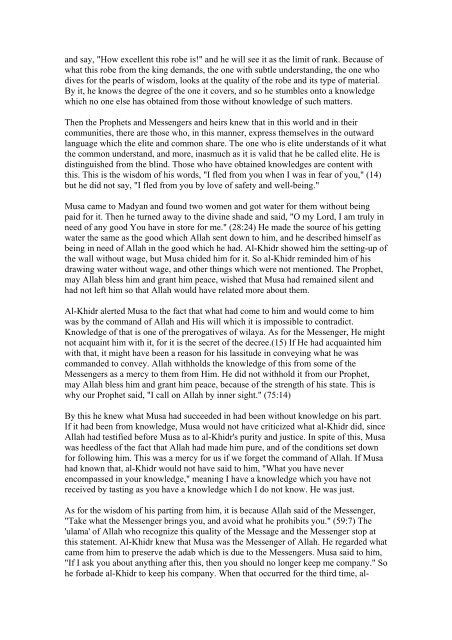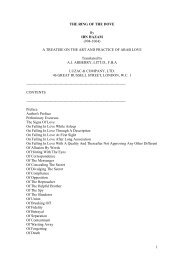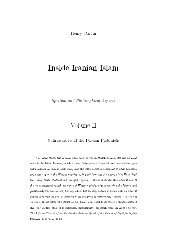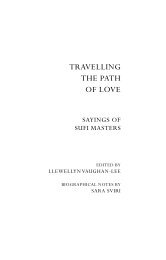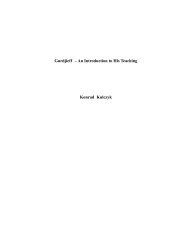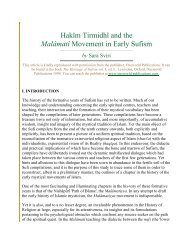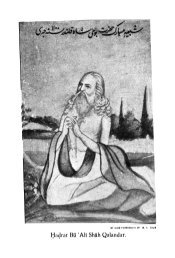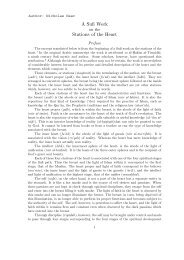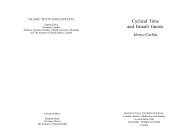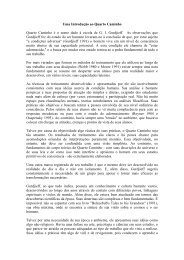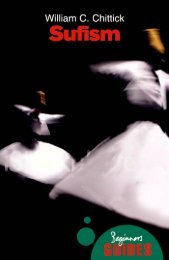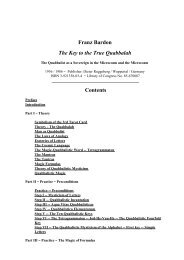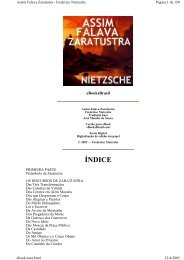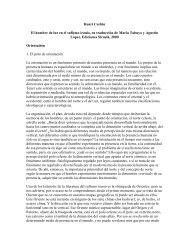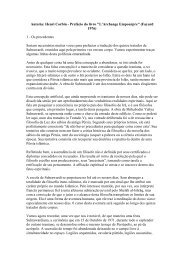Fusus al-Hikam The Seals of Wisdom by Shaykh al ... - ImagoMundi
Fusus al-Hikam The Seals of Wisdom by Shaykh al ... - ImagoMundi
Fusus al-Hikam The Seals of Wisdom by Shaykh al ... - ImagoMundi
You also want an ePaper? Increase the reach of your titles
YUMPU automatically turns print PDFs into web optimized ePapers that Google loves.
and say, "How excellent this robe is!" and he will see it as the limit <strong>of</strong> rank. Because <strong>of</strong><br />
what this robe from the king demands, the one with subtle understanding, the one who<br />
dives for the pearls <strong>of</strong> wisdom, looks at the qu<strong>al</strong>ity <strong>of</strong> the robe and its type <strong>of</strong> materi<strong>al</strong>.<br />
By it, he knows the degree <strong>of</strong> the one it covers, and so he stumbles onto a knowledge<br />
which no one else has obtained from those without knowledge <strong>of</strong> such matters.<br />
<strong>The</strong>n the Prophets and Messengers and heirs knew that in this world and in their<br />
communities, there are those who, in this manner, express themselves in the outward<br />
language which the elite and common share. <strong>The</strong> one who is elite understands <strong>of</strong> it what<br />
the common understand, and more, inasmuch as it is v<strong>al</strong>id that he be c<strong>al</strong>led elite. He is<br />
distinguished from the blind. Those who have obtained knowledges are content with<br />
this. This is the wisdom <strong>of</strong> his words, "I fled from you when I was in fear <strong>of</strong> you," (14)<br />
but he did not say, "I fled from you <strong>by</strong> love <strong>of</strong> safety and well-being."<br />
Musa came to Madyan and found two women and got water for them without being<br />
paid for it. <strong>The</strong>n he turned away to the divine shade and said, "O my Lord, I am truly in<br />
need <strong>of</strong> any good You have in store for me." (28:24) He made the source <strong>of</strong> his getting<br />
water the same as the good which Allah sent down to him, and he described himself as<br />
being in need <strong>of</strong> Allah in the good which he had. Al-Khidr showed him the setting-up <strong>of</strong><br />
the w<strong>al</strong>l without wage, but Musa chided him for it. So <strong>al</strong>-Khidr reminded him <strong>of</strong> his<br />
drawing water without wage, and other things which were not mentioned. <strong>The</strong> Prophet,<br />
may Allah bless him and grant him peace, wished that Musa had remained silent and<br />
had not left him so that Allah would have related more about them.<br />
Al-Khidr <strong>al</strong>erted Musa to the fact that what had come to him and would come to him<br />
was <strong>by</strong> the command <strong>of</strong> Allah and His will which it is impossible to contradict.<br />
Knowledge <strong>of</strong> that is one <strong>of</strong> the prerogatives <strong>of</strong> wilaya. As for the Messenger, He might<br />
not acquaint him with it, for it is the secret <strong>of</strong> the decree.(15) If He had acquainted him<br />
with that, it might have been a reason for his lassitude in conveying what he was<br />
commanded to convey. Allah withholds the knowledge <strong>of</strong> this from some <strong>of</strong> the<br />
Messengers as a mercy to them from Him. He did not withhold it from our Prophet,<br />
may Allah bless him and grant him peace, because <strong>of</strong> the strength <strong>of</strong> his state. This is<br />
why our Prophet said, "I c<strong>al</strong>l on Allah <strong>by</strong> inner sight." (75:14)<br />
By this he knew what Musa had succeeded in had been without knowledge on his part.<br />
If it had been from knowledge, Musa would not have criticized what <strong>al</strong>-Khidr did, since<br />
Allah had testified before Musa as to <strong>al</strong>-Khidr's purity and justice. In spite <strong>of</strong> this, Musa<br />
was heedless <strong>of</strong> the fact that Allah had made him pure, and <strong>of</strong> the conditions set down<br />
for following him. This was a mercy for us if we forget the command <strong>of</strong> Allah. If Musa<br />
had known that, <strong>al</strong>-Khidr would not have said to him, "What you have never<br />
encompassed in your knowledge," meaning I have a knowledge which you have not<br />
received <strong>by</strong> tasting as you have a knowledge which I do not know. He was just.<br />
As for the wisdom <strong>of</strong> his parting from him, it is because Allah said <strong>of</strong> the Messenger,<br />
"Take what the Messenger brings you, and avoid what he prohibits you." (59:7) <strong>The</strong><br />
'ulama' <strong>of</strong> Allah who recognize this qu<strong>al</strong>ity <strong>of</strong> the Message and the Messenger stop at<br />
this statement. Al-Khidr knew that Musa was the Messenger <strong>of</strong> Allah. He regarded what<br />
came from him to preserve the adab which is due to the Messengers. Musa said to him,<br />
"If I ask you about anything after this, then you should no longer keep me company." So<br />
he forbade <strong>al</strong>-Khidr to keep his company. When that occurred for the third time, <strong>al</strong>-


